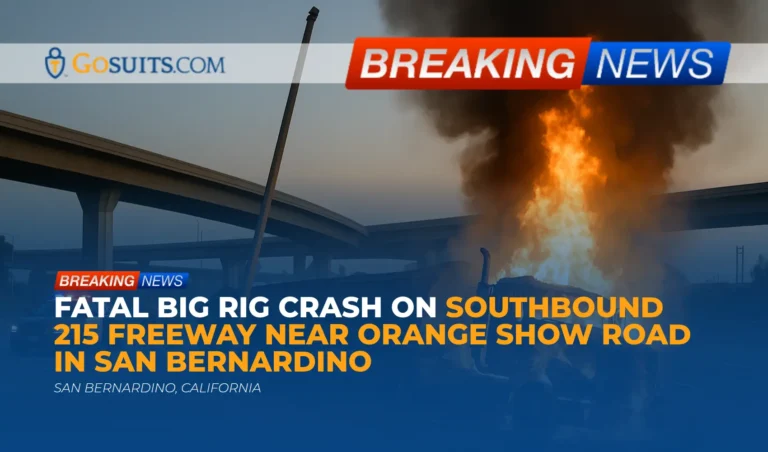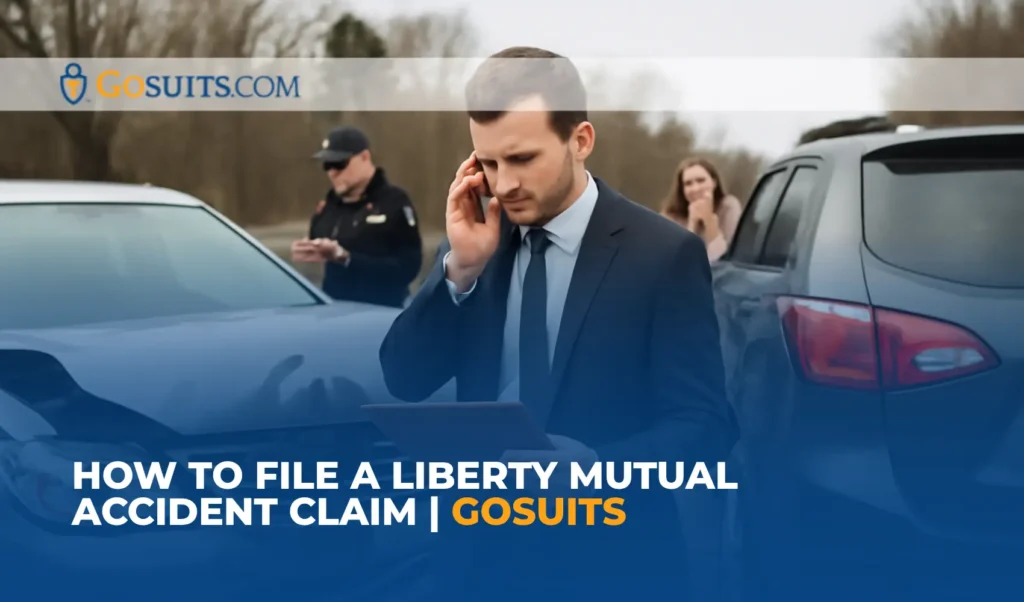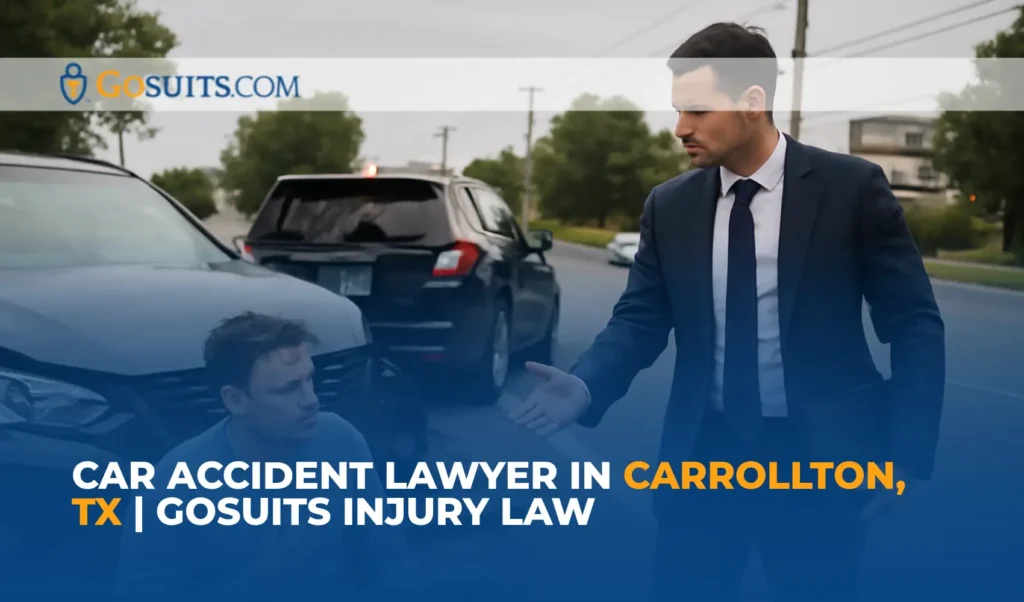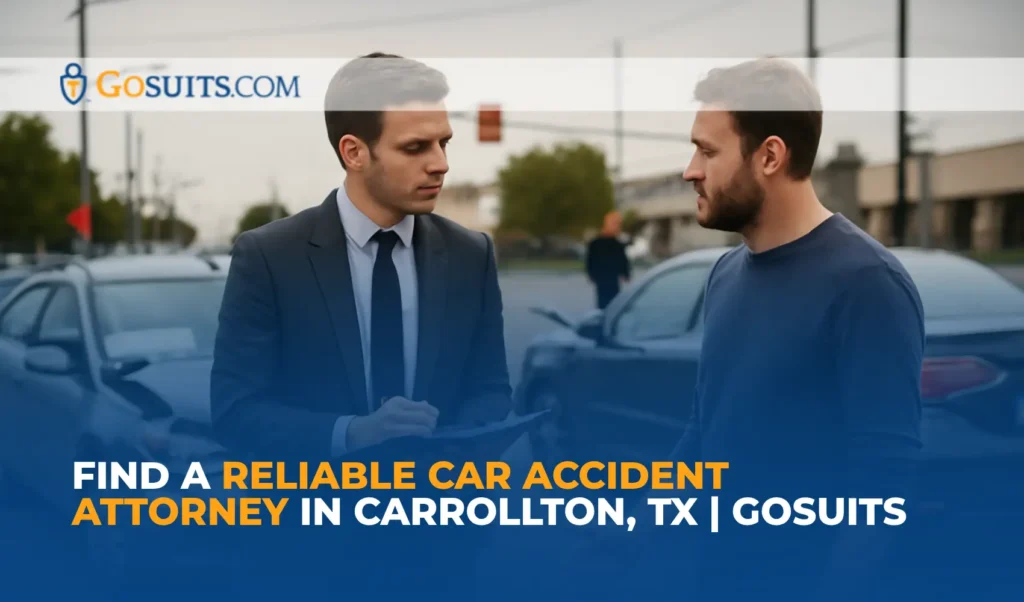Index
- Summary of the crash
- What families and witnesses should do first
- How to obtain official records and reports
- Possible civil liability and legal issues (general overview)
- Insurance considerations after a commercial truck crash
- Evidence preservation and investigation sources
- Coroner, autopsy, and death certificate: what families should expect
- Common questions families ask after a fatal truck crash
- Helpful government resources and contacts
- Commentary from Gosuits San Bernardino, California Personal Injury Attorney
Summary of the crash
According to local reporting, one person died early Thursday morning in a crash involving a big rig on the southbound 215 Freeway near Orange Show Road in San Bernardino, California. California Highway Patrol (CHP) officers said the crash occurred at about 2:00 a.m. The big rig, which was hauling gravel, lost control, struck a pole on the freeway shoulder, overturned and caught fire while the driver remained inside. Debris from the trailer was strewn across the roadway. The driver was pronounced dead at the scene. CHP investigators closed southbound lanes for several hours under a SigAlert while they examined the scene. The semi’s trailer was registered to a local business; investigators had not released information about the driver’s identity or where the driver was based at the time of reporting.
What families and witnesses should do first
The hours and days after a fatal crash are traumatic and confusing. If you are a family member, witness, or nearby resident affected by this crash, consider the following steps as general information about commonly recommended actions. These steps do not replace legal counsel.
- Immediately after the incident (if you were present)
- Ensure you are safe. Do not approach a burning vehicle or unstable wreckage.
- If you have not already done so, call 911 to report injuries, fire, or hazardous materials.
- Preserve any photos or videos you took at the scene. Time-stamped images and videos can be critical evidence.
- If you can safely collect witness names and contact information, do so—these statements are often valuable later.
- In the following hours and days
- Contact the law enforcement agency that handled the collision (CHP in this case) to ask about the collision report and any next steps for families.
- Contact the local coroner or medical examiner to learn whether an autopsy was performed and how to obtain information about the decedent and release of remains.
- Before providing recorded statements to any insurer or the trucking company, consider seeking a consultation with a seasoned personal injury attorney to understand your rights and how statements may be used later.
- Begin gathering personal records you might need later (identification documents, relationship documentation if you are a family member pursuing a wrongful death claim, and any communications about the incident).
How to obtain official records and reports
Official documents you will likely want to obtain include the law enforcement collision report, the coroner’s or medical examiner’s report, death certificate, 911 call recordings, and any investigative supplements. Below are common avenues for obtaining these items in California. Procedures and timelines vary by agency.
- California Highway Patrol collision report
- CHP investigates many freeway collisions. Families can request the CHP collision or investigative report from the CHP area office that handled the crash. The CHP website provides information about collision records and local area contacts (see chp.ca.gov).
- Collision reports may take several days to weeks to be finalized depending on the complexity of the investigation and whether the CHP continues to develop leads.
- San Bernardino County coroner/medical examiner report and autopsy
- Contact the San Bernardino County Coroner’s Office (or the county office that handled the death) to learn whether an autopsy was performed and how family members may obtain copies. The coroner’s office typically releases cause and manner of death to family members; policies for release to the public vary.
- Death certificates are issued by the county registrar or state vital records office. In California, death certificates are typically requested through the county or the California Department of Public Health.
- Other records
- 911 call recordings and transcripts may be available through the local law enforcement agency or dispatch center, subject to retention policies and release rules.
- Maintenance, inspection, and driver records for the truck are typically in the control of the trucking company. These records may be obtainable later in a civil investigation or by the employer’s insurer.
Possible civil liability and legal issues (general overview)
From a civil personal injury and wrongful death perspective, fatal crashes involving commercial trucks often involve several potential legal issues. The below are common legal theories and questions that can arise in such cases, presented as general information rather than legal advice.
- Driver negligence
- Allegations may include speeding, careless or reckless driving, distraction, impairment, or failure to control the vehicle.
- Motor carrier (trucking company) liability
- A trucking company can sometimes be held responsible under theories such as negligent hiring, negligent retention, insufficient training, or vicarious liability for its employee drivers.
- Vehicle condition, maintenance, and loading
- Improper loading (overloading, unsecured cargo), poor vehicle maintenance (brakes, tires, steering), or defective parts can contribute to loss of control. Records such as maintenance logs, weight tickets, and load manifests are important to investigate.
- Regulatory compliance
- Federal rules require commercial carriers and drivers to comply with hours-of-service limits, vehicle inspections, and electronic logging device (ELD) rules. Noncompliance with Federal Motor Carrier Safety Administration (FMCSA) rules can be relevant to liability and fault (see fmcsa.dot.gov).
- Roadway design or hazard
- In some cases, roadway defects, signage, or maintenance may be relevant to a crash. These issues involve separate public agencies and different legal processes.
Insurance considerations after a commercial truck crash
Commercial truck crashes are typically handled differently than passenger vehicle collisions because of the types of insurance involved and the potential size of claims. Families should know the following general points.
- Types of insurance likely involved
- Commercial auto liability insurance carried by the trucking company is often the primary source of compensation for victims or their families. There may also be coverage for cargo damage, uninsured/underinsured motorist coverage for other vehicles, and employer liability.
- Dealing with insurers
- Insurance companies will often contact victims or families quickly after a crash. Statements taken by adjusters, recorded or written, can be used in evaluating or defending claims. For that reason, it is generally advisable to seek legal counsel before making detailed statements to insurers or signing releases.
- Workers and employees
- If the driver was an employee, there may be workers’ compensation implications for the driver’s estate or dependents. Workers’ compensation and civil wrongful death claims can intersect and may have different procedures and compensation rules.

Evidence preservation and investigation sources
Thorough investigation in commercial vehicle crashes often relies on evidence that can disappear quickly. Families and their legal representatives typically try to identify, preserve and obtain the following kinds of evidence:
- CHP crash scene photos and diagrams
- Truck’s electronic logging device (ELD) data and GPS records (fmcsa.dot.gov explains ELD requirements)
- Dashboard camera or company telematics footage
- Driver records, including training, licensing (CDL), drug and alcohol testing results
- Vehicle maintenance and inspection logs
- Loading manifests, weight tickets, and bills of lading showing cargo weight and distribution
- Witness statements, surveillance cameras in the area, and nearby business video
- Physical evidence, including damaged vehicle parts that may show mechanical failure
Because trucking companies and insurers may dispose of or overwrite data (for example, dashcam footage or telematics), it is often important for a preservation or spoliation hold to be issued quickly if a civil claim is anticipated. This is an area where families frequently seek legal guidance early in the process.
Coroner, autopsy, and death certificate: what families should expect
When a death results from a vehicle collision, the county coroner or medical examiner will generally be involved. Below are general points about what to expect and how families can obtain information.
- Role of the coroner/medical examiner
- The coroner or medical examiner investigates sudden, unexplained, or traumatic deaths and determines the cause and manner of death. They also coordinate with law enforcement during investigations.
- Autopsy reports and release
- Not every fatal crash results in a full autopsy, but when performed, autopsies are part of the coroner’s investigation. Families usually have a right to be notified and to request copies of autopsy reports, though public release policies vary by jurisdiction.
- Death certificate
- Death certificates are issued through the county or state vital statistics office. Families will need the death certificate for insurance claims, estate matters, and arranging final disposition.
- Practical steps
- Contact the San Bernardino County coroner’s office to ask whether the body has been released to a funeral home, whether an autopsy was performed, and the procedures for requesting official reports and death certificates.
Common questions families ask after a fatal truck crash
Below are several frequently asked questions and general answers to help families understand typical next steps. These are informational only.
- How long until I can get the CHP collision report?
- It varies. Some CHP reports are available within days; complex or fatal collisions that remain under active investigation can take longer to finalize.
- Who pays for funeral expenses?
- Funeral expenses may be handled by family, the decedent’s estate, or through insurance (life insurance, burial allowance from an employer or the trucker’s insurer) depending on available coverage. Families often consult counsel and providers about short-term options.
- Can I speak to the trucking company or insurer?
- Insurers and companies may reach out quickly. Because early statements and releases can affect later civil claims, families are often advised to obtain a consultation with a seasoned personal injury attorney before giving recorded statements or signing documents.
- Are federal trucking rules relevant?
- Yes. Federal regulations governing driver hours, ELD use, vehicle inspections, and cargo securement can be relevant in determining fault and violations. See the FMCSA for federal rules and guidance (fmcsa.dot.gov).
Helpful government resources and contacts
The following government resources provide authoritative information relevant to commercial vehicle crashes and post-crash procedures. Families may find them useful for general background and for contact information for state and federal agencies.
- California Highway Patrol (CHP) — information about collision reporting and local area offices: https://www.chp.ca.gov
- Federal Motor Carrier Safety Administration (FMCSA) — rules and guidance on commercial vehicle safety, ELDs, and driver regulations: https://www.fmcsa.dot.gov
- National Highway Traffic Safety Administration (NHTSA) — crash data and safety resources: https://www.nhtsa.gov
- California Department of Public Health — information about death certificates and vital records: https://www.cdph.ca.gov
- Caltrans — traffic incident definitions and statewide traffic management resources: https://dot.ca.gov

Commentary from Gosuits San Bernardino, California Personal Injury Attorney
We are deeply sorry for anyone touched by this tragic crash on the 215 Freeway. Losing a loved one in a commercial vehicle collision is devastating. This article is intended for general educational purposes to explain common processes and legal issues that often arise after a fatal truck crash; it is not a substitute for personalized legal counsel.
From a civil personal injury and wrongful death perspective, crashes like the one reported raise several important areas of inquiry: why the truck lost control, whether the vehicle was properly loaded and maintained, whether the driver complied with federal hours-of-service rules, and whether the carrier met its duties when hiring, training, and supervising the driver. Any of these areas may be relevant to a family’s civil claim, depending on the facts uncovered by investigators.
Insurance companies and corporate carriers frequently act quickly after a crash. They may request statements, offer to send forms, or attempt to collect records. Because certain statements and signed releases can affect a family’s ability to pursue compensation later, families should strongly consider consulting with a seasoned personal injury attorney before providing recorded statements to insurers or signing documents. An early consultation can help family members understand what information is safe to provide and what should wait until the full picture is known.
There are strict time limits for civil claims. While the exact timelines depend on state law and circumstances, families should not delay in seeking information about their rights. A timely consultation with a knowledgeable attorney can clarify statutory deadlines, preservation steps that may be necessary, and what documents to request from investigating agencies and the carrier.
Again, our sympathies go out to all affected by this crash. If you are a family member or close relative, speak with a seasoned personal injury attorney to learn about your options and to get help preserving evidence and records while investigators are still working at the scene.






